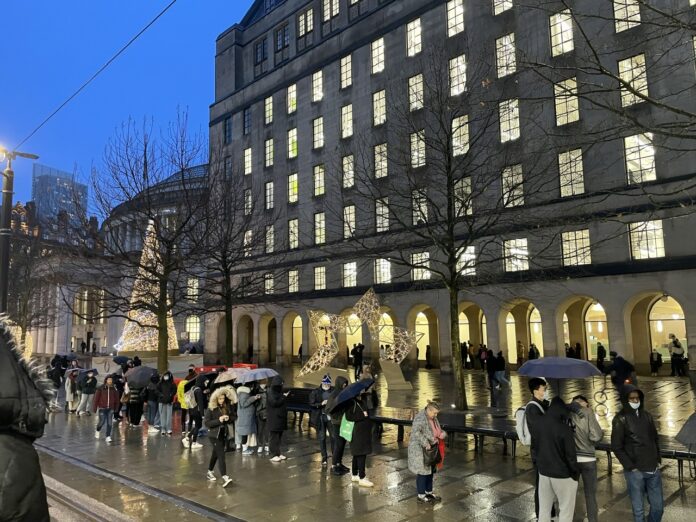Greater Manchester’s Public health leaders have issued a joint statement on the current situation across the region and the country with regard to the Omicron COVID variant
They forecast that the variant will become across the region in the next few days and urge the public to get their booster jabs and encourage those who haven’t to get vaccinate.
Here we publish the statement in full
The rapid rise of the Omicron variant is the starkest of reminders that Covid’s still here. Against a backdrop of falling deaths and hospitalisations from coronavirus, many of us have welcomed the lifting of restrictions over recent months, and after so long been able to make the most of what Greater Manchester offers to its residents. But the fact remains, we are still living through a pandemic, and we all need to keep on taking actions to minimise the risks to ourselves, our loved ones, our communities and our city region as a whole.
While there is still a lot that is not yet known about this new variant, we need to be clear – the threat it presents is real.
When the variant first emerged, we didn’t know how quickly it could spread. We now know it spreads far more easily than other forms of the virus, particularly within households and among friends, family and other close contacts. Over the past week, we have seen the number of probable new daily cases here rise from 76 last Monday to 416 by Friday. That is to say, they are doubling about every two days. We anticipate that Omicron will become the dominant form of the virus in Greater Manchester within days. And these figures are unlikely to show the true extent to which the variant is actually spreading; the UK Health Security Agency’s Chief Medical Advisor has suggested identified numbers of cases may be only 10% of the actual total.
We also didn’t, and still don’t entirely, know how severe the Omicron variant can be. It has been said that this variant is less serious than other forms of the virus, that far fewer people who catch it will end up severely ill, in hospital, or worse. The signs are not yet conclusive, with much analysis being drawn from how the variant has taken hold in areas of South Africa, whose populations are quite different to our own.
But the key point about this is that the rapid spread of the variant means any such gains would quickly disappear. The number of positive Covid test results each day is rising to almost as high as it has been at any stage of the pandemic, and is expected to continue to grow rapidly. Even if a relatively small proportion of these require urgent and critical care, many of our friends and families would be personally affected and the numbers involved could well overwhelm our NHS and public services as we approach the time of winter in which our needs for their support are always highest. Keeping down the number of cases will be key to managing these risks, no matter how harmful this variant of the virus turns out to be.
It was also unclear initially how effective our vaccines would be against this new variant. We now know that two doses of our vaccines are less effective than they were against previous forms of coronavirus which they were specifically designed to tackle. Data published last week suggests that two doses are less effective at protecting against an infection with symptoms, but a third dose boosts your protection back up to over 70%. To put it simply, two doses of vaccine are not enough to give the level of protection we all need against this new variant.
That is why nationally they have launched an urgent appeal for everyone to get boosted now, and why as Directors of Public Health in Greater Manchester’s 10 local areas we are fully behind this push. We are working with colleagues and partners across our city region and beyond to support almost a million extra vaccinations by the end of this year.
So, if you’re aged over 18, three months or more have passed since your second vaccine and you’ve not yet had your booster, please take steps to get your booster now – either through the National Booking System online if you are over 30 (or over 18 from Wednesday), or by walking-in without an appointment at any of the many vaccine centres across the city region.
And if you have already had your booster, you can play an important role in encouraging your eligible friends, family members, colleagues and contacts to get theirs.
And if you’ve not had your first two vaccines yet, it is not too late to start building your protection. The vaccination programme remains open to anyone aged 12 and above, and first and second doses remain available.
But it remains the case that the vaccine is one of a number of measures to limit the most serious consequences of the virus. Everyone involved is doing everything they can to rapidly give vaccines and boosters to all who are eligible – but we cannot protect everyone overnight. We expect it to be the end of the year before everyone is offered their booster. If you test positive for Covid, you are unable to receive a vaccine for 28 days. And even once the booster is given, it takes up to 14 days to offer its full protection.
So to provide the time we need ourselves, for our friends and families, and for the NHS and our public services, it is now as important as it has ever been that we all do our bit to stay safe and stop the virus. This means we all need to keep on doing the small actions that make such a big difference, such as wearing face coverings when visiting busy indoor places and on public transport, letting fresh air indoors and regularly washing our hands. It means continuing to take rapid tests twice a week, and particularly before going to work if you can’t work from home, going to places where you are likely to encounter people you don’t often meet, or visiting groups of friends or family members. It means staying at home and getting a PCR test immediately if we are unwell. It means self-isolating immediately and for the full amount of time when required. And it means making choices about how many people we meet up with over the coming weeks – as the more people we all see, the more chances the virus has to spread.
We know for many people many of these actions won’t be easy, especially after prolonged periods of restrictions to our lives and with planned festive celebrations around the corner. That’s why we’ve made support for our residents a central part of our coronavirus response – whether that’s the additional practical and financial help if you need to self-isolate, or assistance and tools to boost your wellbeing as we continue to live alongside the virus and its impacts. You can access this support through your local council or at Covids Still Here (external link).
We have said throughout the pandemic that the way we will overcome the virus is together. This starts with what we each do ourselves. It can be tempting to look around and find examples of people who don’t appear to be doing the right thing and lose your own motivation to carry on. We’re asking all of our residents to put these feelings to one side and think about their actions not just as individuals but as citizens. The combined impact of the actions we all take personally will be essential to overcome the significant threat the Omicron variant has sent our way.
- Helen Lowey, Director of Public Health, Bolton Council
- Lesley Jones, Director of Public Health, Bury Council
- David Regan, Director of Public Health, Manchester City Council
- Katrina Stephens, Director of Public Health, Oldham Council
- Kuiama Thompson, Director of Public Health, Rochdale Borough Council
- Muna Abdel Aziz, Director of Public Health, Salford City Council
- Jennifer Connolly, Director of Public Health, Stockport Metropolitan Borough Council
- Debbie Watson, Director of Public Health, Tameside Metropolitan Borough Council
- Helen Gollins, Director of Public Health, Trafford Council
- Kate Ardern, Director of Public Health, Wigan Council.







